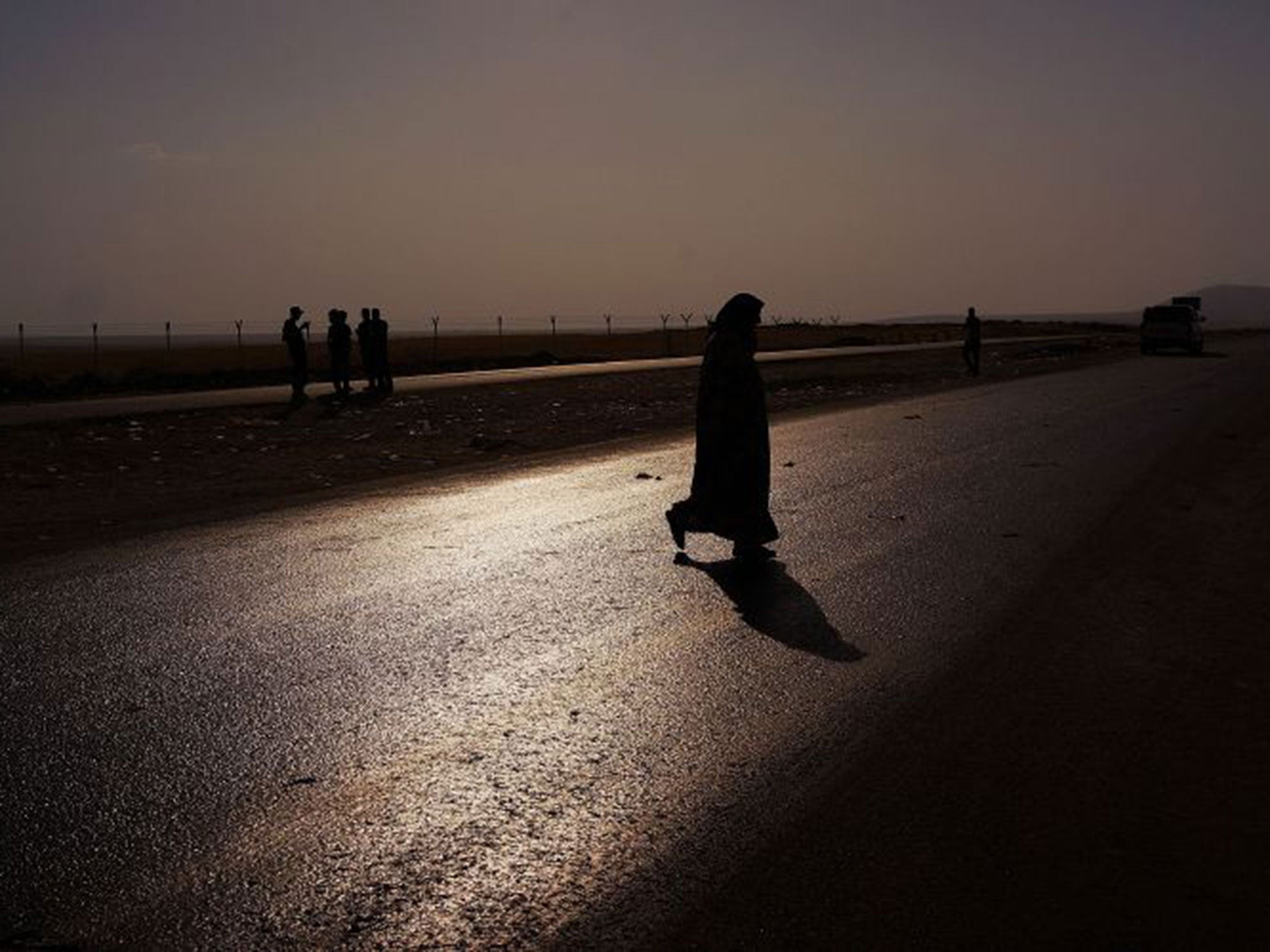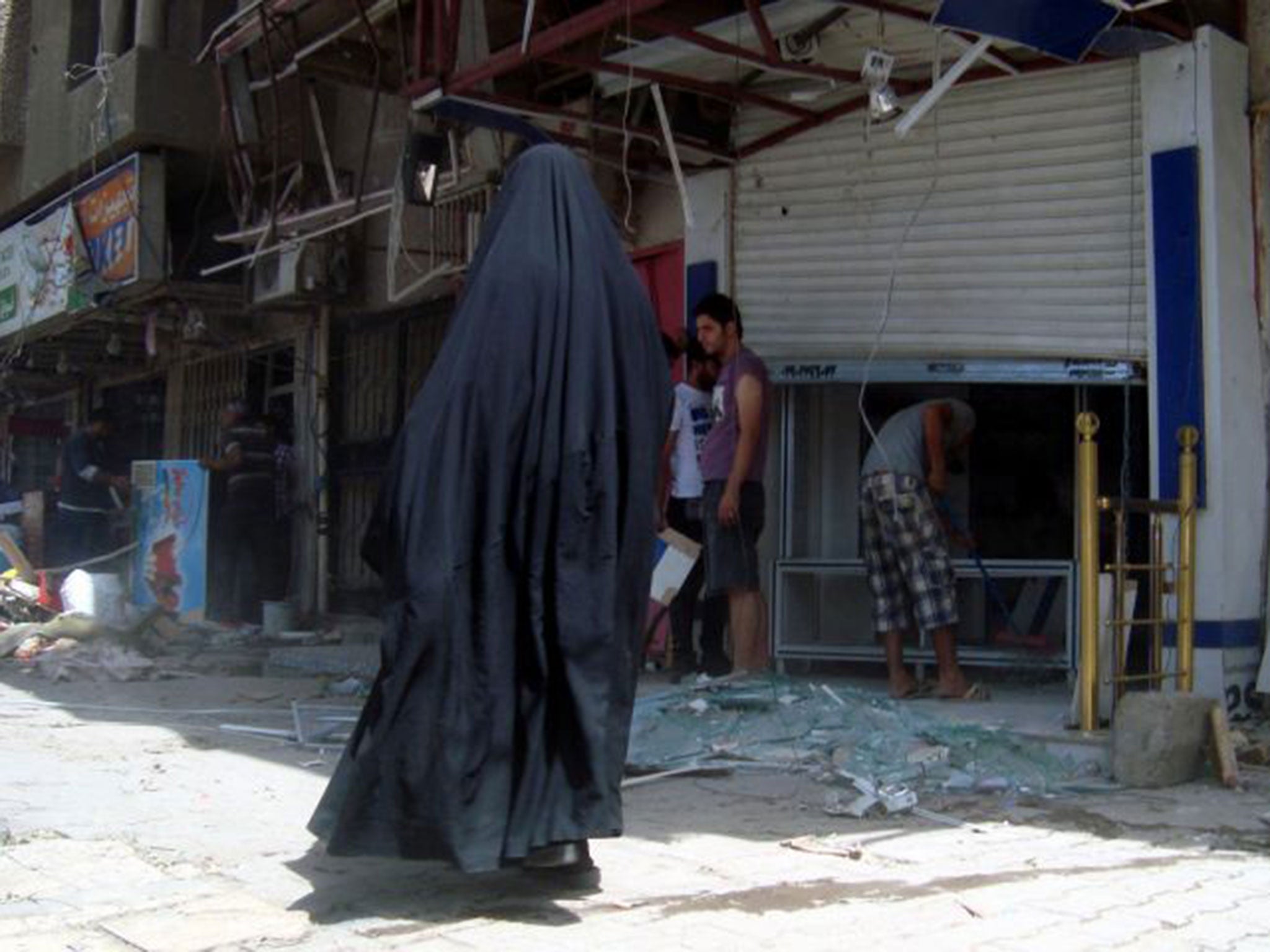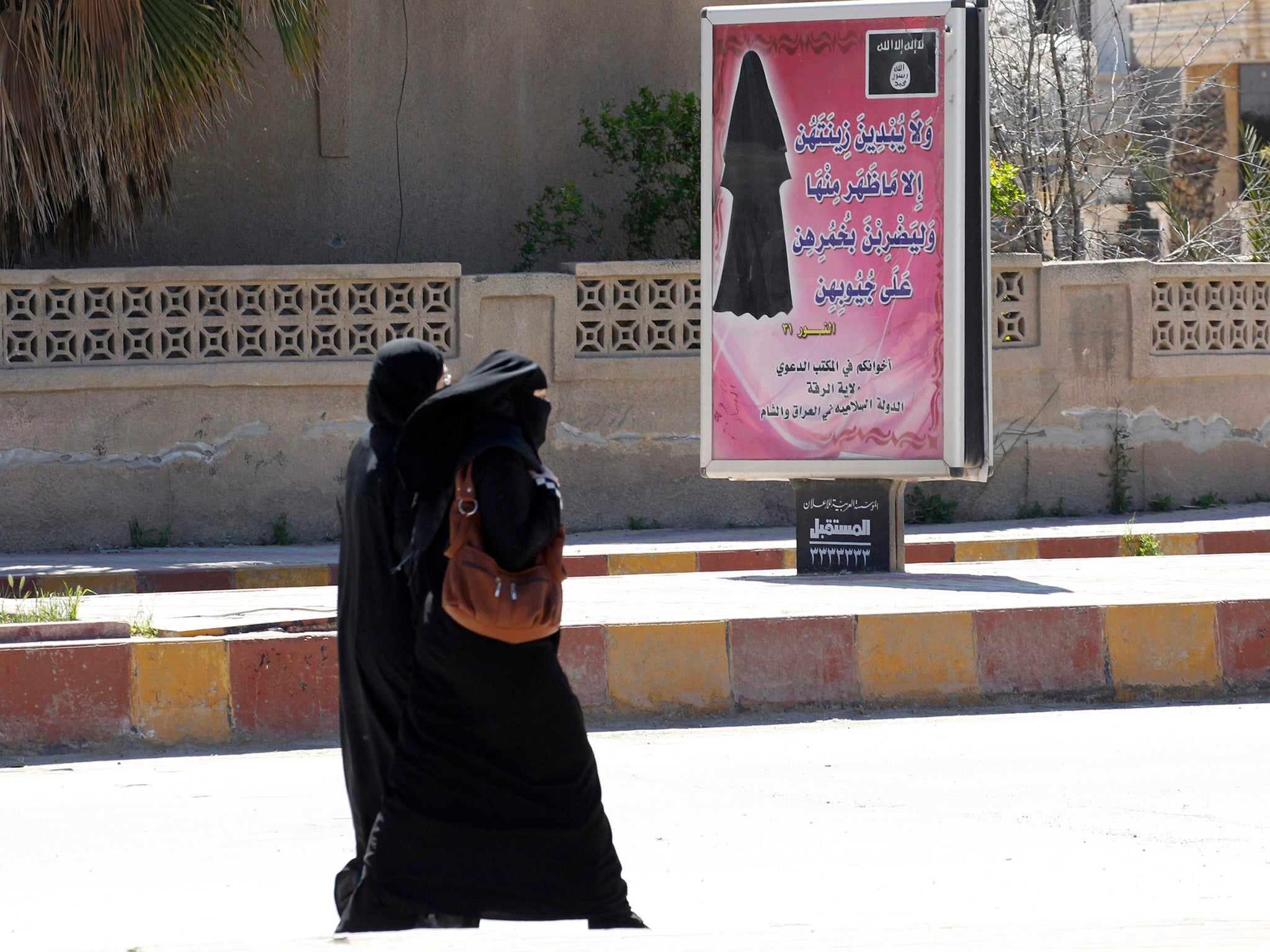War with Isis: The brides brainwashed into becoming suicide bombers
In part one of this special series of dispatches, Patrick Cockburn hears the harrowing stories of women who have escaped from the jihadist state

Your support helps us to tell the story
From reproductive rights to climate change to Big Tech, The Independent is on the ground when the story is developing. Whether it's investigating the financials of Elon Musk's pro-Trump PAC or producing our latest documentary, 'The A Word', which shines a light on the American women fighting for reproductive rights, we know how important it is to parse out the facts from the messaging.
At such a critical moment in US history, we need reporters on the ground. Your donation allows us to keep sending journalists to speak to both sides of the story.
The Independent is trusted by Americans across the entire political spectrum. And unlike many other quality news outlets, we choose not to lock Americans out of our reporting and analysis with paywalls. We believe quality journalism should be available to everyone, paid for by those who can afford it.
Your support makes all the difference.It was when Isis issued a fatwa saying a wife should obey her husband in all matters, including becoming a suicide bomber, that Aysha, a 32-year-old mother of two children, decided to flee her home in Mosul. She recalls that her husband did not ask her directly to be a suicide bomber, but gradually started talking about it. “He was coming home once a week,” she told The Independent, “but recently he came home every day, and finally asked me to attend a new course showing how a Muslim woman could support Muslim society with her soul and body”.
Aysha, which is not her real name, attended the course for two days along with many other women. She was appalled by what she heard. She says “the course was a sort of brainwashing, teaching women to sacrifice cheap worldly things – blood, flesh, soul – for the victory of more precious things – religion, Allah, the Prophet, and, most importantly, the eternal afterlife”.
But instead of being persuaded by these teachings, Aysha was thinking about her children and how to rescue them from the situation she found herself in. On the third day of the course she pretended to be ill and claimed that her son had flu so she had to stay at home. She says that on 3 April “at the time of the Friday prayers I took my children and told them that we were going to visit their aunt in the same district, al-Rifa’ey, that we lived in, but in fact I had already arranged what to do through my cousin. He lives in Zakho [in north-west of the Kurdistan Regional Government zone] and he has helped many people to escape Mosul”. She added that the cousin knew many smugglers in Mosul and KRG. “It cost me about $1,200 (£760) to flee with my son and daughter,” she says.

Aysha was forced to pledge total obedience to her husband, even when it came to suicide bombing. What happened to her illustrates the complete subjection of women under the rule of the self-proclaimed “Islamic State”. Their status has been reduced to that of chattels without rights or independence. A woman is not allowed to leave her house without being accompanied by a male relative. If she does so and is stopped by Isis fighters or officials, they take her back to her home and her husband is given between 40 and 80 lashes for allowing her out alone. All women going outside must wear the niqab, a cloth covering the head and face. In no other society on earth are women treated like this, not even in Saudi Arabia, where they are forbidden to drive, or in Afghanistan, where girls’ schools have been attacked and burnt.
Aysha’s story gives an insight into marriage and daily life within Isis. She gives a fascinating account of the last months of her marriage and her relations with her husband, whom she does not want to name because this might compromise the safety of her children. Prior to Isis forces unexpectedly capturing Mosul, a mainly Sunni Arab city with a population of two million, on 10 June last year, her husband had been an officer in the Iraqi army. Isis kills many of its opponents who are Shia or Yazidi and has driven Christians out of Mosul and surrounding towns, but it offers forgiveness to Sunni Muslims who publicly repent working for the Iraqi army or government.
Aysha says that her husband announced his repentance and offered his services to Isis as a soldier, though it was five months before they trusted him enough to accept him into their ranks where he became a unit commander. Aysha was never sure exactly what he did. “He never told me anything,” she says, “and I didn’t dare ask him because when I once did so his answer was: “Don’t poke your nose into things.” She found drops of blood on his uniform and suspected he took part in killings. He was earning a lot of money and had his share of spoils, property and valuables confiscated by Isis from those it deems to be its enemies. Aysha stole part of her husband’s savings, recalling that “when I left home, I had about $6,000 in addition to my jewellery, but I paid a lot to get out of the city [Mosul] and I paid in advance to get to Turkey”.

After her husband was accepted into Isis as a military officer, Aysha found that his behaviour began to change and he became more aggressive. She says that recently he had started to ask her for obedience “even when it comes to the sacrifice of the soul and body, otherwise I will not win paradise in the afterlife and hell will be my place. In this life I may be punished or be taken to jail.” She responded to these threats by pretending to be wholly obedient to him and to sharia. Aside from pressure on her to become a suicide bomber, she feared that if her husband were killed she would be compelled to marry another Isis commander. It was when her husband was absent on some military operation that Aysha fled to Irbil, the capital of the Kurdistan Regional Government. She has had no contact with him since her escape.
Becoming a martyr in the cause of defeating the enemies of religion is at the heart of the Isis ideology as Aysha was taught during the course her husband insisted she attend. Suicide bombing is an effective military tactic, turning fanatical but untrained volunteers into lethal weapons. Families across the “Islamic State”, which has a population of six million, are fearful that their children will be brainwashed into this self-sacrifice.
This was why Noura, a 36-year-old married woman, fled Mosul with her husband and six children. Isis had established camps where young teenagers were trained for suicide bombing. Noura, who wants her real name kept secret, reached Irbil on 22 March. She told The Independent in an interview that the main reason she and her family left is that “my children were under threat because Isis decided to establish camps for adolescents between 12 and 16 to educate and train them for suicide bombing”. She says the preachers did not speak of “suicide bombing” but of “martyrdom honour”. When these camps were first established it was possible for families to pay a fine instead of sending their children to them, but later attendance became compulsory.
Unlike Aysha, Noura had little money and her husband was jobless. This was a further reason for them and their family to leave Mosul. She explains that “people don’t find jobs, so they offer their services to Isis for food. The problem is that many jobless people start to be attracted to the idea of working with Isis, not because they are happy with it, but because it is the only option available even if it is undesirable.”
Aside from the threat of her children being trained as suicide bombers, Noura found day-to-day living difficult in Mosul. She says there was no public supply of electricity “and we didn’t have the money to pay for the [electric] generators so it was terrible”. Cooking-gas cylinders were expensive, costing 80,000 Iraqi dinars (£44), and tomatoes and potatoes each cost 15,000 dinars (£8) a kilo. There was a lack of clean water. More recently, she has heard by phone from her parents, who are still in Mosul, that things have improved a little and there are two hours’ electricity per day and the price of gas has halved.
Isis must have received more money, says Noura. Her father told her that wheat farmers around Mosul will sell their harvest this year to Isis because it is the only buyer and has promised to pay a high price. Aysha tells much the same story about the lack of electricity – only three hours every two days in her district and none at all in others. There is no shortage of food because Isis imports it from Syria “so we have many products from Aleppo and Raqqa in addition to Iraqi products”. Isis has blown up the mobile phone masts, but mobiles still get a signal in high buildings.
Aysha and Noura’s accounts of life under Isis corroborate each other, but on one point they disagree. Aysha does not think that Isis will be defeated “because, although they are in financial crisis, they have solutions to their crises”. They impose fines on people and on those leaving Mosul: some leave with permission after paying a lot of money, though others are not allowed out for security reasons. Aysha had to pay smugglers to get her out.
Noura, on the contrary, believes that Isis will be defeated because it is running out of money and becoming more corrupt. She says bribery has become rampant but she does not think that US air strikes will defeat Isis. “The devastating factor internally is corruption – bribery, nepotism, favouritism – that will be the final blow.” Significantly, neither woman speaks of any armed resistance to Isis despite its moves to recruit women and children as suicide bombers.
Join our commenting forum
Join thought-provoking conversations, follow other Independent readers and see their replies
Comments